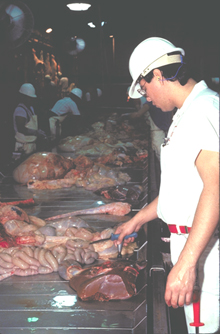| Sustainable Food Guide | Environmental Practice at Work © 2005  |
Issues | Hormone Information...
The U.S. and Canada challenged the EU through the disputes process of the World Trade Organisation. The WTO first ordered the Europeans to drop the import ban however, the WTO allowed the European Union to maintain its ban on hormone-injected beef provided it proves such beef is dangerous to consumers. As a result the EU asked their Scientific Committee to carry out risk assessments of the hormones. They determined that the use of oestradiol 17ß be prohibited, and that the other 5 hormones (testosterone, progesterone, trenbolone acetate, zeranol and melengestrol acetate), be provisionally prohibited until more complete scientific information is made available. The appeal allowed countries to maintain safety standards higher than internationally accepted standards, provided they can show that it is in order to protect its consumers not just their own markets. However, Canada did not remove its retaliatory measures, so in 2004, the European Communities filed a request for consultations with Canada asserting that Canada should have removed its retaliatory measures since the EU has removed the measures found to be WTO-inconsistent. And in 2005, the EU requested a panel to sort the matter out. Latest from WTO. | |||||||


